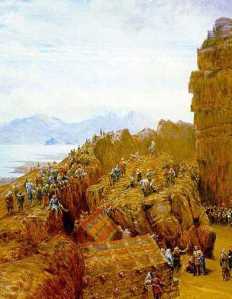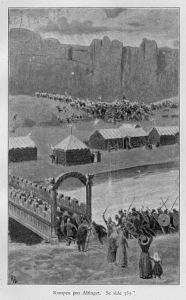So your brother’s been deliberately murdered by one of his neighbors. And you’re both farmers in Viking Age Iceland, around the year 1000. What do you do?
In the United States today, you’d go to the police, lay out your reasons for assuming that the neighbor did the deed, hope the police can find enough evidence to charge the neighbor, have the neighbor tried, and hope there is enough evidence to convict the neighbor. If convicted of murder, the neighbor will spend decades in prison, unless unlucky enough to live in one of the states that still executes murderers. And that’s that.
But, no, you’re in Viking Age Iceland. There are no police. There are no prisons. So what happens instead?
Well, first off, believe it or not, your brother’s neighbor publicly proclaimed he was responsible for the killing. Why? Because then it isn’t murder. Instead, it’s manslaughter. What’s the difference under Icelandic law? The killer can pay compensation, in silver or something valued in silver, to settle a blood-debt incurred by manslaughter. That option isn’t officially open to him if he conceals the killing, a dishonorable course. The killer risks being outlawed, not a trivial penalty.
You think about collecting your farm hands and exacting revenge by killing your brother’s killer. It would be fair, it would be just. But then his brother might summon up a band to come kill you!
So you go to your chieftain, your godi, instead. And you tell him what happened and why you think it happened. You’ve got a clear case: the neighbor announced the killing, and there was a well-known property dispute over some woods, a valuable property. Certainly the godi will see the justice in your case, summon up all his thingmen (supporters) and help you kill your brother’s killer.
Not so fast. Your godi has his own issues. Sure, he wants to retain your loyalty. And he’d like a reputation for justice and wisdom. But that’s one of the reasons he doesn’t immediately offer to help you kill the guilty man. He doesn’t want a blood feud on his hands that could escalate and cost a lot of people their lives, including more of his supporters, maybe even him. And there is credit to be gained if he can settle this matter in your favor but without bloodshed.
That’s not his only concern. Just because you have the facts in your favor doesn’t mean he can successfully prosecute the case. Your brother’s killer has the support of several allied godar (plural of “godi”). Your godi has to consider which other godar he can count on for support. He might eventually decide he can’t support you, in which case you’re out of luck, at least for now.
But let’s say he supports you. You don’t get a hearing immediately. It has to wait until when the quarter court meets at the Althing, the annual Icelandic assembly, in the summer. (They are called quarter courts because Iceland is divided into four quarters for legal purposes.) In the meantime, your side and his side meet several times. There is tremendous pressure put on both of you to settle, though always to the advantage of your side, of course. Meanwhile, everyone is also taking precautions against the other side making a violent move.
You are burning with vengeance, and consider your brother’s title to the woods unassailable in law, so you are looking for revenge and refuse compensation, no matter how much money the killer and his godi offer. Especially because they refuse to even discuss the woods. But your godi is regretting his role in this affair. He’s going to have to use a lot of influence on your behalf, and he makes it clear that he won’t support you any further without something of value from you. Ultimately, he proposes to fight for your rights, but only if you sign over the woods to him when you win. It sounds like a bum deal, but your godi points out that your brother wasn’t able to maintain his rights to that property, and you, who live even farther away, won’t be able to do so either without help. So you agree with a witnessed handshake.
Luckily for you, the killer’s alliance of godar breaks up over other issues, conflicts among them, and he comes to the Althing with very limited support. The godar name the farmers and other men who will hear the evidence and pass judgment, and with his allies, your godi is able to stack the quarter court’s panel with quite a few people favorable to your cause.
The panel at the quarter court hears the evidence presented and witnesses called by both sides, deliberates, and delivers a judgment, both verdict and terms of settlement. It sounds nice and modern. But the panel could be influenced by the political power mustered by the very visible presence of godar and their thingmen supporting each side. No one wants to deliver a verdict that will tear open the Althing with violence.
But you have the best of both worlds: a solid case, and the weight of political influence. The panel decides in your favor. Better yet, the sentence they pronounce on the killer is the maximum that could be inflicted: the greater outlawry. This means that your brother’s killer loses all of his property, and all of his rights. No one can help him, and anyone is free to kill him.
You’re surprised. You figured the best you could hope for was to have him sentenced to the lesser outlawry, which also involves confiscation of his property, but only a three-year exile out of the country instead of forfeiting his life. Your godi notices your surprise, leans over, and whispers in your ear, “The man’s killed before, and while those cases were settled, he’d developed quite the reputation of a trouble-causer. People pretty much agreed that Iceland’s best rid of him for good.”

Grettir survived almost 20 years as an outlaw, but then he was tough enough to put down an Icelandic zombie
The killer flees the Althing, but is killed by your widowed sister-in-law’s family who track him down in the desolate interior. Your godi assists you in taking possession of your brother’s farm, while he gladly takes the disputed woods as your own. You arrange a good marriage between your brother’s eldest son and the daughter of your godi, and settle them and the rest of your brother’s family on the farm you previously occupied.
Everyone’s happy . . . until the killer’s son, thirsting for revenge, kills you fifteen years later. But that’s another story.





This was interesting. Half of me kind of thinks it overall sounds a bit better than our current system. I know that’s probably not true but I can think of several people I’d, uhm, save up some money for. Very cool, Brian!
LikeLiked by 1 person
Keep in mind that Iceland was poor in treasure metals, so they actually treated lengths of standard quality wool as money. So you might be able to weave your way to paying compensation for a killing, always assuming the injured family accepts it!
LikeLiked by 1 person
*eyes the comfy, squishy, warm shawl she’s working on* I could do that!
LikeLiked by 1 person
Is this a case you’ve found in the sagas? Or is it condensed from several? Either way, I do like your slightly light treatment of this particular law. BTW, outlaws when killed had to be buried on the foreshore, between the high and low water marks. That way their remains (and/or spirit) belonged to no gods.
LikeLiked by 1 person
It’s a composite. My original idea was to take the reader step by step through all the likely alternatives. But that produced a narrative that became unwieldy and unreadable. Worse, most saga cases are complicated by kinship ties. Vestiges of these things remain in the article, but in the end I settled for a set of complexities to illuminate the process without making the case TOO complicated.
LikeLiked by 1 person
It works.
LikeLiked by 1 person